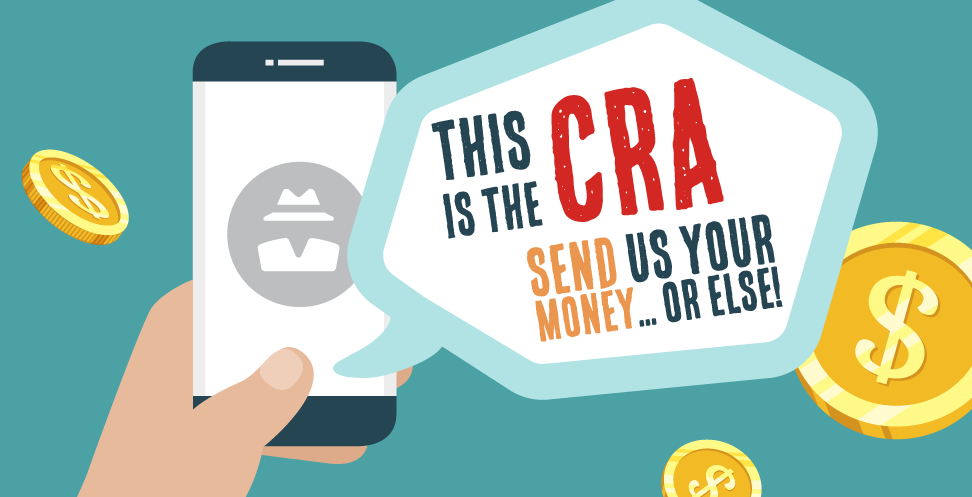
This article was updated in February 2020.
Tax season is prime time for scams and cybercriminals are always getting a head start. Over the last five years, at least 60,000 Canadians have complained about being the target of fraudulent phone calls from the Canadian Revenue Agency (CRA) - including many at UAlberta. Don't panic - these calls are not actually from the CRA. They're from scam artists attempting to steal your personal information.
If you receive one of these phone calls, do not divulge any sensitive information. Hang up and report the call to the Canadian Anti-Fraud Centre. If you believe you've been a victim of tax fraud, follow these steps.
With the filing deadline approaching, many cybercriminals may try to lift your personal information so they can cash in on a refund request or steal your identity. Cybercriminals are crafty, but you can outsmart them by staying vigilant and watching for these tricks.
Be on the Lookout For:
- Phone Calls: If someone calls you claiming to be from the CRA, be skeptical and do not divulge any personal or financial information. The CRA will never call or email you demanding immediate payment without having first mailed a bill, nor will they ask for a credit or debit card number via email or phone.
2. Phishing Emails: Cybercriminals will often send phishing emails that ask you to click on a link, download an attachment, or divulge sensitive information. Watch out for unsolicited emails, texts, social media posts, or fake websites that may lure you in and prompt you to share valuable personal and financial information.
Learn more about how to spot a phishing attack.To Catch a Phish
Learn more about how to spot a phishing attack.
3. Online Tax Preparer Fraud: Most tax preparers provide honest services, but some disreputable individuals may target unsuspecting taxpayers, resulting in refund fraud and/or identity theft. The CRA reminds anyone filing a tax return that the preparer must sign it with his or her preparer tax identification number.
How to Stay Safe:
- Update, Patch, and Tighten Cybersecurity: To avoid being a victim of cybercrime, make sure that the operating system and software on all your devices, including your desktop computer, laptop, and mobile phone or tablet, are up-to-date. Download an antivirus and internet security program if you don't already have one. And if you're filing your taxes through mobile, ensure that your phone or tablet has all the latest updates and is running a cybersecurity program.
2. Use Complex Passwords: Passwords that are too short or simple are easy for a cybercriminal to crack. Choose a password that is at least eight to ten characters long and consists of a mix of numbers, special characters, and upper and lowercase letters.
Get tips from IST on how to select a secure password.myccid.ualberta.caPassword Tips | MyCCID Portal
Get tips from IST on how to select a secure password.myccid.ualberta.ca
3. Exercise Caution When Using Public WiFi: Public WiFi networks are convenient, but unfortunately, they are not secure. Anyone can gain access to a public network to compromise your Internet traffic, monitor your activity, and steal your personal information.
4. When in Doubt, Throw it Out: Cybercriminals are good at what they do, and many times, the phishing emails they send us look legitimate. However, just because something looks real doesn't mean it is. If you receive an email that seems suspicious, even if you know the source, play it safe and delete it.
5. Think Before You Act: Be wary of communications that implore you to act now, especially if you are told you owe money to the CRA and it must be paid immediately. Cybercriminals prey on our emotions, and invoking a sense of urgency is a common tactic. Keep an eye open for any urgent or threatening language.
6. File Taxes from a Secure Website: Before you file a tax return online, ensure that the website begins with https, not http. The extra "s" at the end means that any data sent over that connection is encrypted and cannot be read by hackers. If the website you're using doesn't begin with https, then don't use it to file your tax return.
Remember, the CRA will never do the following:
- Send an email asking you to divulge personal or financial information;
- Call you and ask for monetary payment right away;
- Send any documents or forms unless you specifically requested them.
The only exception is if you call the CRA to request a form or a link for specific information. Then, a CRA agent will forward the information you are requesting to your email during the telephone call.
Don't be a Victim:
While tax fraud is prevalent this time of year, online and phone scams can happen anytime. Stay vigilant year-round and follow the steps outlined by the Government of Canada to protect yourself from fraud and identity theft.
References:
- National Cyber Security Alliance
- Canada Revenue Agency
- Canadian Anti-Fraud Centre
- CBC News
-
Originally posted on the website of the U of A's Chief Information Security Officer on February 10, 2020.website of the U of A's Chief Information Security Officer on February 10, 2020.